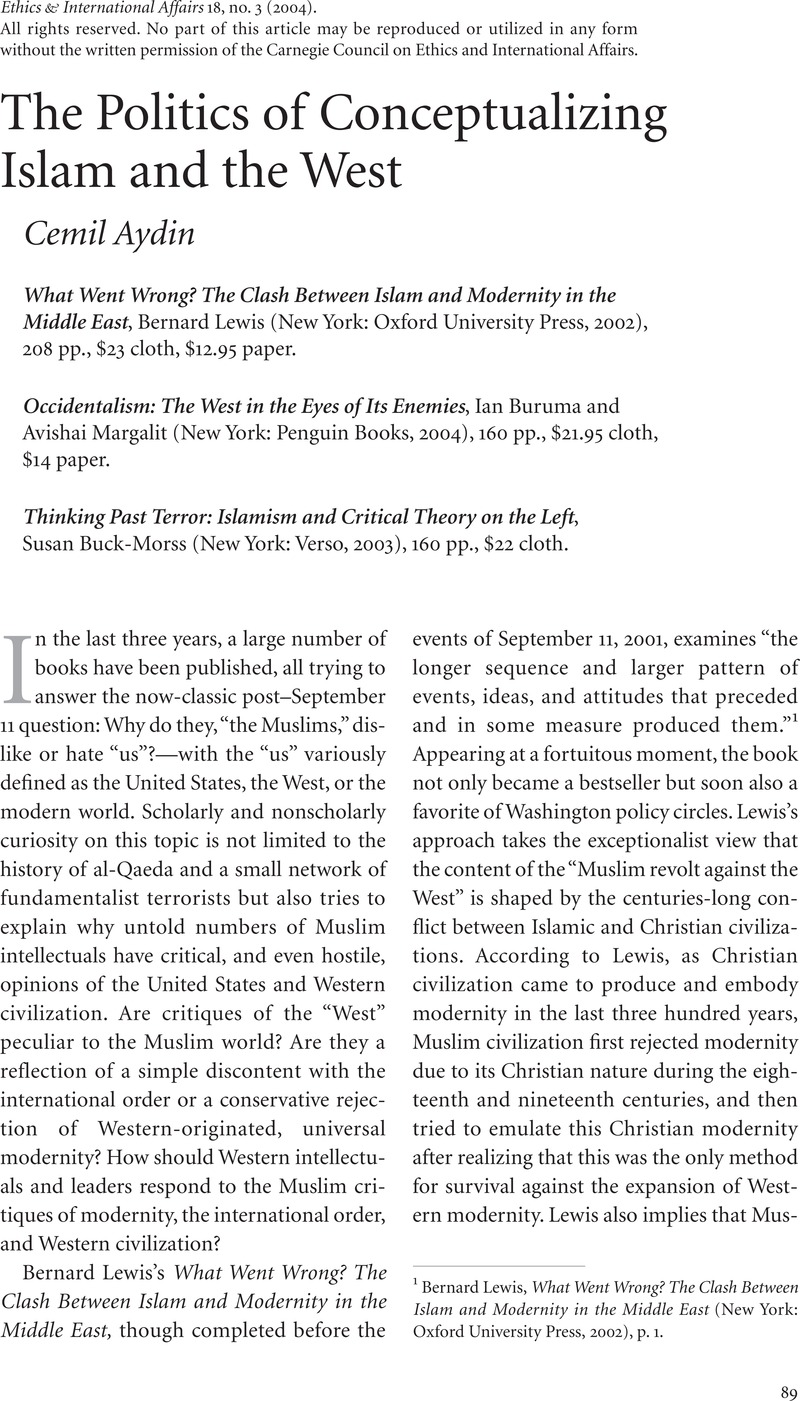Published online by Cambridge University Press: 28 September 2012

1 Lewis, Bernard, What Went Wrong? The Clash Between Islam and Modernity in the Middle East (New York,: Oxford University Press, 2002), p. 1Google Scholar.
2 See Boroujerdi, Mehrzad, Iranian Intellectuals and the West: The Tormented Triumph of Nativism (Syracuse, N.Y.: Syracuse University Press, 1996Google Scholar); Gheissari, Ali, Iranian Intellectuals in the 20th Century (Austin: The University of Texas Press, 1998Google Scholar); and Mirsepassi, Ali, Intellectual Discourse and the Politics of Modernization: Negotiating Modernity in Iran (New York: Cambridge University Press, 2000CrossRefGoogle Scholar).
3 Waldman, Peter, “A Historian's Take on Islam Steers U.S. in Terrorism Fight,” Wall Street Journal, February 3, 2004, p. A1Google Scholar.
4 Lewis's book was criticized by several North American scholars of the Islamic world for the inaccuracies in its interpretative framework. See Juan Cole, “Review of Bernard Lewis's What Went Wrong? Western Impact and Middle Eastern Response,” Global Dialogue, January 27, 2003; available at http://www.juancole.com/essays/revlew.htm. See also Adam Sabra, “What Is Wrong with What Went Wrong?”Middle East Report Online (August 2003); available at http://www.merip.org/mero/interventions/sabra_interv.html.
5 Hay, Stephen N., Asian Ideas of East and West: Tagore and his Critics in Japan, China, and India (Cambridge,: Harvard University Press, 1970CrossRefGoogle Scholar); Rahnema, Ali, An Islamic Utopian: A Political Biography of Ali Shari'ati (New York: I. B. Tauris Publishers, 2000Google Scholar); and Gal-licchio, Marc, The African American Encounter with Japan & China: Black Internationalism in Asia, 1895–1945 (Chapel Hill: University of North Carolina Press, 2000Google Scholar).
6 Duara, Prasenjit, “The Discourse of Civilization and Pan-Asianism,” Journal of World History 12, no. 1 (Spring 2001), pp. 99 – 130CrossRefGoogle Scholar; Adas, Michael, “Contested Hegemony: The Great War and the Afro-Asian Assault on the Civilizing Mission Ideology,” in Duara, Prasenjit, ed., Decolonization (New York: Routledge, 2004), pp. 78–100Google Scholar; Bradley, Mark, Imagining Vietnam and America: The Making of Postcolonial Vietnam, 1919–1950 (Chapel Hill: University of North Carolina Press, 2000Google Scholar); and Manela, Erez, “The Wilsonian Moment and the Rise of Anticolonial Nationalism: The Case of Egypt,” Diplomacy & Statecraft 12, no. 4 (2000), pp. 99–122CrossRefGoogle Scholar.
7 Sayyid, Bobby S., A Fundamental Fear: Eurocentrism and the Emergence of Islamism (London,: Zed Books, 1997Google Scholar); and Davutoglu, Ahmet, “Political and Institutional Dimensions of Secularization: A Comparative Analysis,” in Esposito, John and Tamimi, Azzam, eds., Islam and Secularism in the Middle East (New York: New York University Press, 2000), pp. 170–208Google Scholar.
8 Ahmed Riza, a secular intellectual and a leading follower of Auguste Comte's positivist ideas, wrote one of the most comprehensive critiques of “the West” in 1922. See Riza, Ahmed, The Moral Bankruptcy of Western Policy Towards the East (Ankara, Turkey: Ministry of Culture and Tourism Publications, 1988Google Scholar).
9 Pollmark Polling Agency (Ankara), “Report on Turkish Public Opinion with Regard to Nato and the West” (July 2004).
10 Ramadan, Tariq, “ What Does America Have to Fear from Me? Virtue, Vice and My Visa ,” International Herald Tribune , September 1, 2004 , p. 6Google Scholar.
11 Daniel Pipes wrote in support of the decision in “Why Revoke Tariq Ramadan's U.S. Visa?”New York Sun, August 27, 2004, p. 9. Ramadan responded in “Scholar under Siege Defends his Record: Tariq Ramadan Responds Point by Point to the ‘Unfounded Allegations’ of a Critic,”Chicago Tribune, August 31,2004, p. C17.
12 “Letter Regarding Dr. Tariq Ramadan,” sponsored by the Middle East Studies Association of North America's Committee on Academic Freedom and the Board of Directors for the American Academy of Religion (August 30,2004), available at http://www.aarweb.org/about/announce/2004/ramadanoi.asp.